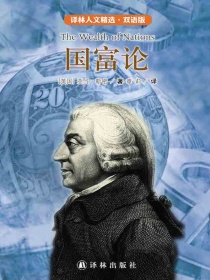编辑推荐
本书是亚当·斯密的伦理学著作,斯密从人类的情感和同情心出发,讨论了善恶、美丑、正义、责任等一系列概念,进而揭示出人类社会赖以维系、和谐发展的秘密。
内容简介
亚当·斯密一生奉献了两部传世经典:《道德情操论》和《国富论》,前者为伦理学著作,它使斯密享誉学术界;后者奠定了他作为英国古典政治经济学奠基人的崇高地位和名望。相比《国富论》,《道德情操论》给西方世界带来的影响更为深远,对促进人类福利这一更大的社会目的起到了更为基本的作用。在书中,斯密用同情的基本原理来阐释正义、仁慈、克己等一切道德情操产生的根源,说明道德评价的性质、原则以及各种美德的特征,并对各种道德哲学学说进行了介绍和评价,进而揭示出人类社会赖以维系、和谐发展的基础,以及人的行为应遵循的一般道德准则。
作者简介
作者亚当·斯密,英国哲学家和经济学家,古典政治经济学代表人物。1723年生于苏格兰伐夫郡的柯科迪,十四岁时入格拉斯哥大学,在弗兰西斯·哈奇森的教导下研读道德哲学。1740—1746在牛津大学学习。1751年被任命为格拉斯哥大学的逻辑学教授,翌年改任道德哲学教授。1759年出版《道德情操论》,1776年出版《国富论》。1778年获得苏格兰海关专员的职位,1790年7月17日于爱丁堡去世。
章节目录
版权信息
道德情操论(中文)
亚当·斯密的真正遗产
第一卷 论行为得体
第一篇 论得体
第一章 论同情
第二章 论互相同情的快乐
第三章 论通过我们和他人感情是否一致,来判断其情感是否得体
第四章 续前章
第五章 论和蔼可亲及令人尊敬的品德
第二篇 论不同激情的得体度
导言
第一章 论源于躯体的激情
第二章 论源于想象的某种特殊倾向或习惯的激情
第三章 论乖戾的激情
第四章 论良善的激情
第五章 论自私的激情
第三篇 论幸运与不幸对人们判断行为是否得体的影响;何以有时容易被认可,有时则不易
第一章 同给予快乐的同情相比,我们给予悲痛的同情一般来讲是一种更为强烈的感情,但在当事人的自然感觉中却依然不够强烈
第二章 论野心的起源,及等级的差别
第三章 论嫌贫爱富、贵尊贱卑的倾向所导致的道德情操之腐败
第二卷 论功过,或奖惩对象
第一篇 论功过意识
导言
第一章 看似值得感谢,似乎就值得报答;同样,看似令人怨恨,似乎就应该受罚
第二章 论感激与怨恨的适当对象
第三章 对施惠者的行为缺乏赞许,对受惠者的感激之情就缺少体会;相反,对作恶者的动机缺乏责难,对受害者的怨恨之情就缺乏体谅
第四章 前几章扼要重述
第五章 对功过意识的分析
第二篇 论正义和仁慈
第一章 两种美德的比较
第二章 论正义感、悔恨感,兼论功德意识
第三章 论如此天性构成的作用
第三篇 就行为的功过,论命运对人类情感的影响
第一章 论命运产生影响的原因
第二章 论命运之影响的程度
第三章 论此种情感超常性的终极因
第三卷 论我们判断自己情感和行为的基础,及责任感
第一章 论自我认可和不认可的原则
第二章 论对赞赏及值得赞赏的喜爱;及对责备和该受责备的畏惧
第三章 论良心的影响与权威
第四章 论自欺的天性,及一般规则的起源与运用
第五章 论一般道德准则的影响与权威,及它们被公正地尊为神之法
第六章 何种情况下责任感应是我们行为的唯一动机;何种情况下它应与其他动机共同发挥作用
第四卷 论效用对认可情感的影响
第一章 论效用的表现赋予一切艺术品的美,及这种美的广泛影响
第二章 论效用的表现赋予人类性格与行为之美;及对这种美的感知在何种程度上是初始的认可原则之一
第五卷 论习俗与风尚对道德上认可与否的影响
第一章 论习俗与风尚对我们美丑观念的影响
第二章 论习俗与风尚对道德情操的影响
第六卷 论美德的品格
导言
第一篇 论个人品格对自己幸福的影响;或论谨慎
第二篇 论个人品格对他人幸福的影响
第一章 论天性使个人成为我们关注对象所依据的次序
第二章 论天性使社团成为我们慈善对象的次序
第三章 论普世仁爱
第三篇 论自制
结论
第七卷 论道德哲学体系
第一篇 论道德情操理论应该考察的问题
第二篇 论对美德本质的不同阐述
第一章 论认为美德存在于得体性之中的学说
第二章 论认为美德存在于谨慎之中的学说
第三章 论认为美德存在于仁慈之中的学说
第四章 论出格的学说
第三篇 论关于认可之原理的各种不同学说
导言
第一章 论以自爱推断认可之原理的学说
第二章 论将理性视为认可之原理的学说
第三章 论认为情感是认可之原理的学说
第四篇 论不同作者诠释道德实践准则的方式
道德情操论(英文)
PART Ⅰ Of the PROPRIETY of ACTION
SECTION Ⅰ Of the SENSE of PROPRIETY
CHAP. Ⅰ Of SYMPATHY
CHAP. Ⅱ Of the Pleasure of mutual Sympathy
CHAP. Ⅲ Of the manner in which we judge of the propriety or impropriety of the affections of other men, by their concord or dissonance with our own
CHAP. Ⅳ The same subject continued
CHAP. Ⅴ Of the amiable and respectable virtues
SECTION Ⅱ Of the Degrees of the different Passions which are consistent with Propriety
INTRODUCTION
CHAP. Ⅰ Of the Passions which take their origin from the body
CHAP. Ⅱ Of those Passions which take their origin from a particular turn or habit of the Imagination
CHAP. Ⅲ Of the unsocial Passions
CHAP. Ⅳ Of the social Passions
CHAP. Ⅴ Of the selfish Passions
SECTION Ⅲ Of the Effects of Prosperity and Adversity upon the Judgment of Mankind with regard to the Propriety of Action; and why it is more easy to obtain their Approbation in the one state than in the other
CHAP. Ⅰ That though our sympathy with sorrow is generally a more lively sensation than our sympathy with joy, it commonly falls much more short of the violence of what is naturally felt by the person principally concerned
CHAP. Ⅱ Of the origin of Ambition, and of the distinction of Ranks
CHAP. Ⅲ Of the corruption of our moral sentiments, which is occasioned by this disposition to admire the rich and the great, and to despise or neglect persons of poor and mean condition
PART Ⅱ Of MERIT and DEMERIT; or, of the Objects of REWARD and PUNISHMENT
SECTION Ⅰ Of the SENSE of MERIT and DEMERIT
INTRODUCTION
CHAP. Ⅰ That whatever appears to be the proper object of gratitude, appears to deserve reward; and that, in the same manner, whatever appears to be the proper object of resentment, appears to deserve punishment
CHAP. Ⅱ Of the proper objects of gratitude and resentment
CHAP. Ⅲ That where there is no approbation of the conduct of the person who confers the benefit, there is little sympathy with the gratitude of him who receives it: and that, on the contrary, where there is no disapprobation of the motives of the person who does the mischief, there is no sort of sympathy with the resentment of him who suffers it
CHAP. Ⅳ Recapitulation of the foregoing chapters
CHAP. Ⅴ The analysis of the sense of Merit and Demerit
SECTION Ⅱ Of Justice and Beneficence
CHAP. Ⅰ Comparison of those two virtues
CHAP. Ⅱ Of the sense of Justice, of Remorse, and of the consciousness of Merit
CHAP. Ⅲ Of the utility of this constitution of Nature
SECTION Ⅲ Of the Influence of Fortune upon the Sentiments of Mankind, with regard to the Merit or Demerit of Actions
INTRODUCTION
CHAP. Ⅰ Of the causes of this Influence of Fortune
CHAP. Ⅱ Of the extent of this Influence of Fortune
CHAP. Ⅲ Of the final cause of this Irregularity of Sentiments
PART Ⅲ Of the Foundation of our Judgments concerning our own Sentiments and Conduct, and of the Sense of Duty
CHAP. Ⅰ Of the Principle of Self-approbation and of Self-disapprobation
CHAP. Ⅱ Of the love of Praise, and of that of Praise-worthiness; and of the dread of Blame, and of that of Blame-worthiness
CHAP. Ⅲ Of the Influence and Authority of Conscience
CHAP. Ⅳ Of the Nature of Self-deceit, and of the Origin and Use of general Rules
CHAP. Ⅴ Of the influence and authority of the general Rules of Morality, and that they are justly regarded as the Laws of the Deity
CHAP. Ⅵ In what cases the Sense of Duty ought to be the sole principle of our conduct; and in what cases it ought to concur with other motives
PART Ⅳ Of the EFFECT of UTILITY upon the Sentiment of Approbation
CHAP. Ⅰ Of the beauty which the appearance of UTILITY bestows upon all the productions of art, and of the extensive influence of this species of Beauty
CHAP. Ⅱ Of the beauty which the appearance of Utility bestows upon the characters and actions of men; and how far the perception of this beauty may be regarded as one of the original principles of approbation
PART Ⅴ Of the INFLUENCE of CUSTOM and FASHION upon the Sentiments of Moral Approbation and Disapprobation
CHAP. Ⅰ Of the Influence of Custom and Fashion upon our Notions of Beauty and Deformity
CHAP. Ⅱ Of the Influence of Custom and Fashion upon Moral Sentiments
PART Ⅵ Of the CHARACTER of VIRTUE
INTRODUCTION
SECTION Ⅰ Of the Character of the Individual, so far as it affects his own Happiness; or of Prudence
SECTION Ⅱ Of the Character of the Individual, so far as it can affect the Happiness of other People
INTRODUCTION
CHAP. Ⅰ Of the Order in which Individuals are recommended by Nature to our care and attention
CHAP. Ⅱ Of the order in which Societies are by nature recommended to our Beneficence
CHAP. Ⅲ Of universal Benevolence
SECTION Ⅲ Of Self-command
PART Ⅶ Of Systems of MORAL PHILOSOPHY
SECTION Ⅰ Of the Questions which ought to be examined in a Theory of Moral Sentiments
SECTION Ⅱ Of the different Accounts which have been given of the Nature of Virtue
INTRODUCTION
CHAP. Ⅰ Of those Systems which make Virtue consist in Propriety
CHAP. Ⅱ Of those Systems which make Virtue consist in Prudence
CHAP. Ⅲ Of those Systems which make Virtue consist in Benevolence
CHAP. Ⅳ Of licentious Systems
SECTION Ⅲ Of the different Systems which have been formed concerning the Principle of Approbation
INTRODUCTION
CHAP. Ⅰ Of those Systems which deduce the Principle of Approbation from Self-love
CHAP. Ⅱ Of those Systems which make Reason the Principle of Approbation
CHAP. Ⅲ Of those Systems which make Sentiment the Principle of Approbation
SECTION Ⅳ Of the Manner in which different Authors have treated of the practical Rules of Morality
道德情操论(译林人文精选·双语版)是2016年由译林出版社出版,作者[英] 亚当·斯密。
得书感谢您对《道德情操论(译林人文精选·双语版)》关注和支持,如本书内容有不良信息或侵权等情形的,请联系本网站。

















